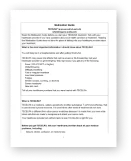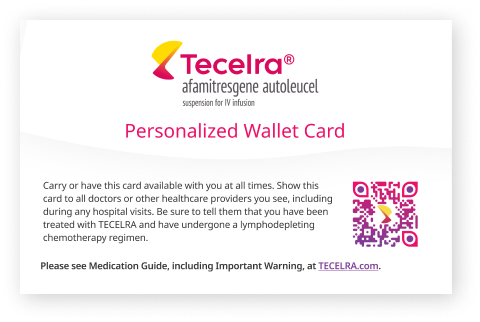You are now leaving this site
This link will take you to a third-party site that is not owned by Adaptimmune. Click “OK” if you would like to proceed or click “Cancel” to stay on this site.
Every step of the Adaptimmune TECELRA journey is personal—coordinating with your care team, carefully handling your cells, and using our unique method to create a therapy just for you. Adaptimmune is committed to supporting you throughout your TECELRA treatment experience. The resources and support groups listed below may help you on your treatment journey.
Here are some important resources to give you more information about TECELRA and help you during your treatment journey.

An overview of programs offered through AdaptimmuneAssist, and how AdaptimmuneAssist can help you through your treatment journey.

A comprehensive guide for you and your loved ones to learn more about TECELRA, including information on the treatment journey, clinical trial results, and resources available through AdaptimmuneAssist.

The TECELRA Medication Guide for patients, including Important Warning.

A handy wallet card that includes important information to share with any of your doctors and for your quick reference. You can download and print to carry with you or save it to your phone's digital wallet for easy access.
Fill out the wallet card hereCancer organizations and patient support groups may offer information about cancer, help you through your treatment journey, or even connect you with a local support group. This can be a place to share experiences, learn about the latest cancer news, and even get encouragement through a community that understands what you are going through.
You can also utilize this list of compassionate support groups to find potential financial, housing, mental health, and transportation assistance and resources for you and your loved ones.
Adaptimmune does not control or endorse third-party organizations. As such, Adaptimmune makes no representation as to the accuracy or any other aspect of the information supplied by these organizations or contained on these websites. The information provided is meant for informational purposes only. It is not meant to replace your physician's medical advice.
TECELRA is a medicine, called a genetically modified autologous T cell immunotherapy, that is used to treat synovial sarcoma. It is used when other kinds of treatment do not work. TECELRA is different from other cancer medicines because it is made from your own white blood cells that are made to recognize and attack your cancer cells. Your healthcare provider will perform tests to see if TECELRA is right for you. TECELRA is approved based on patient response data. Additional data are needed to confirm the clinical benefit of TECELRA. It is not known if TECELRA is safe and effective in children.
Please see Medication Guide, including Important Warning.
Important Warning: You will likely be in a hospital before and after getting TECELRA. TECELRA may cause side effects that can be severe or life-threatening. Call your healthcare provider or get emergency help right away if you get any of the following: fever (100.4°F/38°C or higher); chills/shivering; difficulty breathing; fast or irregular heartbeat; low blood pressure; fatigue; severe nausea, vomiting, or diarrhea; severe headache; or new skin rash. Tell all your healthcare providers that you were treated with TECELRA.
After getting TECELRA, you will be monitored daily at the healthcare facility for at least 7 days after the infusion. You should plan to stay close to a healthcare facility for at least 4 weeks. Do not drive, operate heavy machinery, or do other activities that could be dangerous for at least 4 weeks after you get TECELRA. Your healthcare provider will do blood tests to follow your progress. It is important that you have your blood tested. If you miss a scheduled appointment for your collection of blood, call your healthcare provider as soon as possible to reschedule.
Before you receive TECELRA, tell your healthcare provider about all the medicines and supplements you take and your medical conditions, including: seizure, stroke, confusion, or memory loss; heart, liver, or kidney problems; low blood pressure; lung or breathing problems; recent or active infection; past infections that can be reactivated following treatment with TECELRA; low blood counts; pregnancy, you think you may be pregnant, or plan to become pregnant; breastfeeding; or taking a blood thinner.
The most common side effects of TECELRA include nausea, vomiting, fatigue, infection, constipation, fever (100.4°F/38°C or higher), abdominal pain, difficulty breathing, decreased appetite, diarrhea, low blood pressure, back pain, fast heart rate, chest pain, general body swelling, low white blood cells, low red blood cells, and low platelets.
You are encouraged to report side effects to the FDA at (800) FDA‑1088 or www.fda.gov/
Please see Medication Guide, including Important Warning.
TECELRA is a medicine, called a genetically modified autologous T cell immunotherapy, that is used to treat synovial sarcoma. It is used when other kinds of treatment do not work. TECELRA is different from other cancer medicines because it is made from your own white blood cells that are made to recognize and attack your cancer cells. Your healthcare provider will perform tests to see if TECELRA is right for you. TECELRA is approved based on patient response data. Additional data are needed to confirm the clinical benefit of TECELRA. It is not known if TECELRA is safe and effective in children.
Please see Medication Guide, including Important Warning.
Important Warning: You will likely be in a hospital before and after getting TECELRA. TECELRA may cause side effects that can be severe or life-threatening. Call your healthcare provider or get emergency help right away if you get any of the following: fever (100.4°F/38°C or higher); chills/shivering; difficulty breathing; fast or irregular heartbeat; low blood pressure; fatigue; severe nausea, vomiting, or diarrhea; severe headache; or new skin rash. Tell all your healthcare providers that you were treated with TECELRA.
After getting TECELRA, you will be monitored daily at the healthcare facility for at least 7 days after the infusion. You should plan to stay close to a healthcare facility for at least 4 weeks. Do not drive, operate heavy machinery, or do other activities that could be dangerous for at least 4 weeks after you get TECELRA. Your healthcare provider will do blood tests to follow your progress. It is important that you have your blood tested. If you miss a scheduled appointment for your collection of blood, call your healthcare provider as soon as possible to reschedule.
Before you receive TECELRA, tell your healthcare provider about all the medicines and supplements you take and your medical conditions, including: seizure, stroke, confusion, or memory loss; heart, liver, or kidney problems; low blood pressure; lung or breathing problems; recent or active infection; past infections that can be reactivated following treatment with TECELRA; low blood counts; pregnancy, you think you may be pregnant, or plan to become pregnant; breastfeeding; or taking a blood thinner.
The most common side effects of TECELRA include nausea, vomiting, fatigue, infection, constipation, fever (100.4°F/38°C or higher), abdominal pain, difficulty breathing, decreased appetite, diarrhea, low blood pressure, back pain, fast heart rate, chest pain, general body swelling, low white blood cells, low red blood cells, and low platelets.
You are encouraged to report side effects to the FDA at (800) FDA‑1088 or www.fda.gov/
Please see Medication Guide, including Important Warning.
This link will take you to a third-party site that is not owned by Adaptimmune. Click “OK” if you would like to proceed or click “Cancel” to stay on this site.